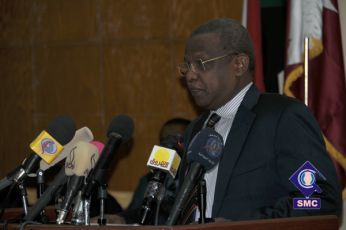Sudan’s NISS says released “all detainees”
July 12, 2011 (KHARTOUM) – Sudan’s National Security and Intelligence Services (NISS) on Tuesday claimed it has released all of its detainees as instructed by the country’s president, Omer Hassan Al-Bashir.

SMC quoted the director of the NISS’s media office as saying that his boss, NISS chief Mohamed Atta, decreed that all detainees held in Khartoum and other states be released on basis of Bashir’s directives.
Sudan’s notorious security apparatus, NISS, enjoys wide-ranging powers of arrest, detention, search and seizure under the country’s 2010 National Security Act.
Under the act, NISS agents also enjoy immunity against prosecution for acts carried out as part of their work.
According to the NISS media chief, all their departments were now devoid of any detainee.
He claimed that there are no political detainee in NISS custody and that most of the released detainees were held on cases related to supporting rebel groups and cross-border crimes.
Among those reportedly released is Mohamed Nur Ushar, the half-brother of the Justice and Equality Movement (JEM) leader Khalil Ibrahim.
Ushar was sentenced to death in 2009 along with more than a dozen of JEM fighters for a 2008 attack on Khartoum in which more than 200 people were killed.
However, the Sudanese president did not officially endorse the sentence which held up its implementation. It is believed that Khartoum wanted to use it as a bargaining chip in its peace talks with JEM.
There are no proper statistics on the number of people held in NISS custody but rights activists estimate them to be significant.
NISS has repeatedly stood accused of using its powers to arbitrarily arrest and torture human rights defenders, journalists and dissidents.
A large number of anti-government activists accused NISS of torturing and holding them incommunicado for periods of time exceeding the legal period of preventive custody under the law.
NISS also uses its powers to censor local newspapers prior to print in order to purge them of content deemed anti-government.
(ST)
